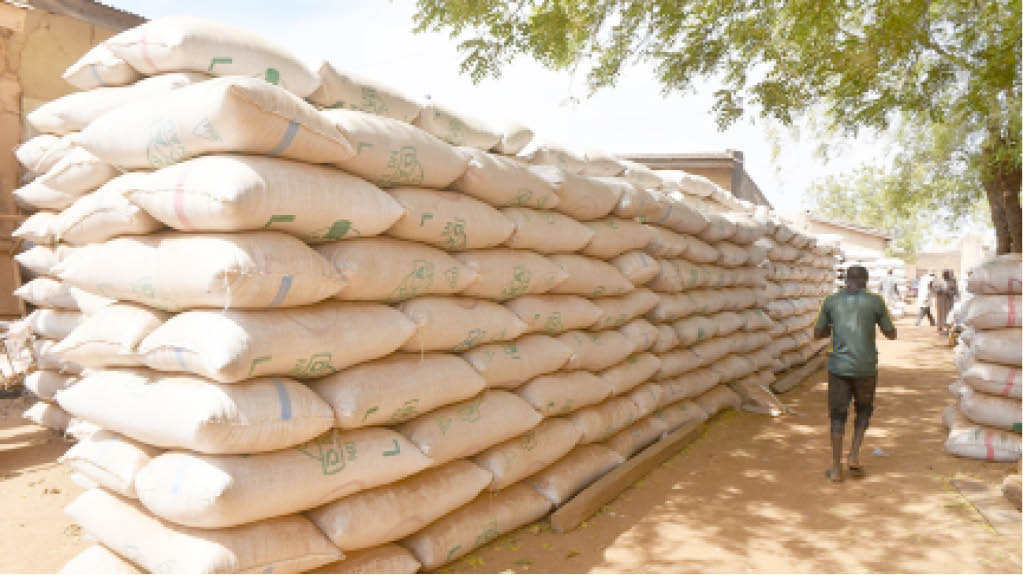Dawanau International Grain Market, situated in Kano State, has been for ages the nucleus of West African grain business. It has also been a source of employment as well as huge revenue generation to the state.
The market, which deals with both cash and food crops, has been serving the grain needs of the state, nation and neighbouring countries as well as serving as a storage centre for grain, to regulate the commodity’s price when the need arises.
It is also on record that the market has been a source of pride to grain merchants and farmers as it gives them an opportunity to trade on a fair ground with maximum security of their lives and investments.

The market was established over 46 years ago after a fire incident consumed several grain shops at the market’s initial Sabon Gari location.
According to sources, it was after the fire incident that the state government in collaboration with businessmen in the market began to look for alternatives. After serious searching, the present location was sited even though many marketers refused to relocate initially.
The market gradually expanded its business coverage to African countries such as Niger, Chad, Cameroon and many others, after it was relocated to its present location.
According to a grain merchant at the market, Malam Barau Bello Gwarjo, many grain merchants were not happy with the then relocation but they had no option than to abide by government’s directives.
According to him, the relocation of the market from its former location to its present location which was perceived as a negative development turned out to be the best decision ever taken in the history of positive development in the market.
“The grain market was initially situated at Galadima in Sabon Gari and when the government saw the market’s rapid development; it decided to relocate it to its present location at Dawanau.
“I have been in this market for over 30 years, and believe me that decision has been the best decision taken in the history of the market’s positive development,” said Gwarjo.
While the market was initially serving as a centre for obtaining grains, particularly sorghum and millet for mini export and local consumption, positive development over the period of the market’s existence has generated a series of positive transformation within the market’s operational as well as structural development.
Similarly, the market is said to have gradually become a centre for exportation of cash crops such as beans, sesame, tamarin, ginger and hibiscus popularly known as Zobo, among others.
Traders in the market revealed that the market is known to be exporting about 45 percent of West Africa’s grain supply.
A visit to the market revealed that at the all-day busy market, goods are on daily basis traded to states within Nigeria as well as other countries across the globe.
It was also revealed that traders from various parts of Nigeria and West African countries patronize the market on a daily basis.
Our reporter observed the presence of many people from other parts of the country that can’t even speak the local Hausa language conduct businesses with the assistance of interpreters.
Some sections of the market present a vast field of cash crop displayed for prospective buyers while other parts display well packaged processed commodities ready for exportation.
Malam Mousa Sadou is a citizen of Niger Republic and also a grain businessman, who said he has been patronizing Dawanau market for over 20 years.
According to him, “For years I have been a regular face in this market, the people here are very industrious and trustworthy. Though I am from the Republic of Niger, they took me as their brother and we have been doing business for over 20 years now,” he said.
Another grain dealer operating in the market, Alhaji Amadi Nasiru, told our reporter that the market offers the best grains as well as the best price and as such it earns the confidence of global grain merchants.
“It is not easy to get best offers in terms of grains and prices as compared to what is obtainable in Dawanau market. That is why the market is able to maintain its status as the best and biggest grain market in Africa,” he said.
A female grain merchant from Benue State, Mrs Rita Bako, said she gets all her grain supply which she takes to Benue on retail bases from Dawanau market.
She added that based on the fact that the market offers her best quality grains, she has resolved to maintain the business relationship.
The Chairman, Dawanau International Grain Market Association, Alhaji Sani Ahmad Kwa, revealed that the market has grown and expanded to what is known today as international grain market, and supplies West Africa as well as other parts of the world with varieties of grain.
According to him, the market, which was initially known for the supply of food crops only, has metamorphosed into a major supplier of various cash crops for export to various countries across the world.
He further revealed that due to the fact that the market is becoming a force to reckon with in terms of grain business across the world, various stakeholders have ventured into development activities to upgrade the market’s status.
According to him, Nigerian Stored Products Research Institute (NSPRI) recently sensitized 60 members of the market’s association on appropriate pesticides handling during grain preservation for easy acceptability of commodities supplied from the market to other places across the globe.
Daily Trust’s recent investigative report revealed that some farmers across Nigeria had taken to using the deadly insecticide called Sniper to preserve beans leading to several health complications for consumers.
“NSPRI has done a lot in ensuring that business in this market is being conducted in accordance with best practices in grains management handling. The institute installed for us a modern storage facility to store our commodities for free. We believe the knowledge acquired will go a long way in changing the way merchants store their grains,” the market association’s chairman said.
He added that with the recent development going on in the market, various foreign business communities from Asia and other parts of the world have begun to establish their exportation companies within the market.
The export of cash commodities from the market, he said, has expanded to America, Asia and some European countries, adding that no fewer than 90 to 100 trucks of assorted grain leave the market on daily bases for local consumption while about 60 to 70 trucks leave the market for exportation daily.
Most of these commodities are sourced locally within Nigeria and its neighbouring countries.
“Though the market is currently at a point of conforming to modern grain market facilities, exportation has gained a strong ground in the market. Go round and you will find out that there are over 350 internationally registered companies conducting their businesses here.
“Our business outlets have grown tremendously and business in the market is now more lucrative than it was years back. There are over 4500 people earning a living directly and indirectly on daily bases in this market and you can imagine what revenue is accrued to the local government and the state,” he revealed.
The chairman further stated that the upgrading of the market’s standard is a gradual process, as such ample time is needed to ensure a successful upgrading.
It was reliably gathered that with collaborations between the federal, state and local government’s authorities, the market will soon be linked with an independent power supply system while a modern warehousing system has been provided and a new modern public convenience as well as new roads network within the market is in the pipeline.
Dawanau international grain market also serves at either retailing or distribution level and as such, provides business opportunities for the locals and neighbouring communities in the state.

 Join Daily Trust WhatsApp Community For Quick Access To News and Happenings Around You.
Join Daily Trust WhatsApp Community For Quick Access To News and Happenings Around You.


